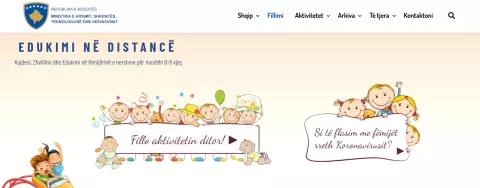Elevating private sector support for early childhood education at times of COVID-19 crisis
The Association of Private Preschool Institutions successfully advocated for 1 million Eur of government funding to sustain private preschools during the pandemic

The COVID-19 pandemic has caused a global crisis effecting every person in the world and created an environment of rapidly changing needs. The closure of early learning institutions threatened not only the foundation of children’s development, but also had a crippling effect on many private preschool institutions in Kosovo, which rely solely on income generated from monthly tuitions of children enrolled.
Aiming to ensure continued learning and development for children during the pandemic, UNICEF supported the Ministry of Education and Science to develop and launch the digital platform “Distance Education”. Through various informative videos and articles for parents, and daily activity ideas for children of ages 0-6, the platform targets not only children confined at home during the pandemic, but also those who are not enrolled to any preschool institution. The reach is further amplified through the emission of daily activities on the national TV channel – RTK4.
“The private preschool institutions in Kosovo have been largely affected by the COVID-19 pandemic due to the three-month shutdown, and at the same time children have suffered the need to socialize. Our sector is still trying to recover from the losses we encountered during the pandemic.” declared Ms. Gëzime Rexhepi Çollaku, the founder of Bardha Academy and Chair of Board of the Association of Private Preschool Institutions (APPI).
With the goal to expand access to early childhood education and contribute to quality standardization, UNICEF supported the establishment of the Association of Private Preschool Institutions, established in February of 2020. Based on MICS data of 2020, access to early childhood learning in Kosovo remains at a low of 15% of children aged 3-4 years old, while access is only 8% for Roma, Ashkali and Egyptian children. With a total of 44 public preschools , and 125 licensed private preschools across Kosovo, the private sector represents a wide-reaching service provider for early childhood education; thus, also an important stakeholder in shaping the developmental outcomes of children during their crucial years.
The closure of preschools also shuddered the sustainability of many private preschools as revenues declined and many teachers and educators were laid off. While official data is not available, the Association received information from member preschools and colleagues, highlighting the plummeting enrollment of children and difficulties to maintain the facilities operational. Same concerns were also raised to government institutions, particularly to the Ministry of Education and Science and the Ministry of Finance, by Ms. Çollaku who has voiced the challenges faced by private preschool institutions in her capacity of Chair of Board of APPI.
“It’s been a challenge for all private kindergartens to operate with full capacity due to the pandemic, hence they had to shorten the staff and request lower rent prices in order to ensure good quality services and hygiene measures. The APPI has raised the voice to the public institutions to emphasize the need of supporting private kindergartens. In hopes that there will be no more shutdowns, APPI plans on supporting private kindergartens through early childhood education trainings in the near future.” added Ms. Rexhepi Çollaku.
As early learning institutions begun to gradually reopen in May, creating safe learning environments became a priority, implemented through adjusted curriculums with smaller class sizes, hygiene practices and safety measures. However, while some parents sent their children back to the preschool, the numbers remained short of total enrollment capacities, while protective and hygiene measures added further financial stress on private preschools. In the capacity to represent the private sector, the Association converted the crisis into advocacy to attain financial support for private preschools.
Addressing challenges raised by Ms. Çollaku, the Agency for Gender Equality (AGE) within the Office of the Prime Minister dedicated funds in amount of 1 million Eur to support private preschool and preprimary institutions in the scope of “projects and initiatives that aim to strengthen women’s role in the society and economy”. A total of 113 selected preschool and preprimary institutions across Kosovo (72% of total) will benefit from grant funding for their operational expenses.
The Head of UNICEF Office in Kosovo, Mr. Murat Sahin, emphasized that ensuring that children have access to quality ECD services is critical to building a strong foundation of health, cognitive and socio-emotional development. “UNICEF is committed to work with parents, Kosovo institutions, donor community and Association of Kindergartens to expand quality and coverage of preschool education in Kosovo” – highlights Murat Sahin, Head of UNICEF Kosovo Office”, Sahin said.
UNICEF Kosovo has been systematically engaged in supporting Early Childhood Development (ECD) and Education in Kosovo. The functionalization of the Association of Private Preschool Institutions is an important milestone in this regard, which successfully advocated for greater access to financial support and access to early learning for children during the pandemic. It further shows the institutional commitment of the private preschool sector to improve quality, provide inclusive services and enhance development outcomes of children aged 0-6 years old.




